Getting to outcomes in employability
On April 7, we had an engaging session by Mr Shrikanth Sinha, the CEO of TASK, the Telangana Academy for Skills & Knowledge.
About Mr Shrikanth Sinha
As the CEO of TASK, Mr Sinha’s major role is enhancing the employability of the youth in Telangana. He has been responsible for onboarding several Government degree colleges and polytechnics and multiple industry partners. Some 718 colleges are currently on board. TASK has enabled 700,000 + jobs to aspiring job seekers. Most entry level jobs in the state are advertised on the TASK portal.
Mr Sinha has also enhanced the offerings at TASK. He has sharpened the focus on the rural areas, along with skilling and placement of girls and the underserved communities. With the onset of the COVID pandemic, Mr Sinha has been spearheading the transition of conventional training programs to virtual (online and blended) mode. He has initiated several webinar series on various subjects.
Mr Sinha is an Executive Council Member of Jawaharlal Nehru Technological University. He is a Member of AVGC Sub Task Force for the Media and Entertainment Skill Council. He is also a Committee Member of FICCI (Federation of Indian Chambers of Commerce and Industry). An eminent speaker at national and international forums, Mr Sinha is an Advisory Council Member for the Digital Safety and Security Programme.
Prior to joining TASK, Mr Sinha was the CEO of NASSCOM Foundation, the social development arm of NASSCOM, where he led the ‘tech 4 good’ movement in the country for a little over 4 years. Through his unique perspectives and diverse and rich experience spanning over 34+ years, he helped take NASSCOM Foundation to newer heights and helped create a much larger impact.
Prior to joining NASSCOM Foundation, Mr Sinha was based in Malaysia, working as Head Corporate learning, APAC and MENA, at GlobalNxt University (formerly U21Global), a leading Online Graduate School. The university helped thousands of people working in corporates across the Asia-Pacific, Middle-East and North African regions with limited or no access to good quality academic opportunities.
Earlier in his career, Mr Sinha played a pivotal role in the success of APTECH in India, in Latin America & the Middle East. Mr Sinha is a student of Computer Applications & Physics from Delhi University.
Introduction
The Indian education system has traditionally emphasised memorizing and reproducing facts in the examination. Students are not encouraged to think for themselves. That is why they face a big challenge after joining the industry.
Our economy has grown well so far. Part of the credit goes to the education system. But going forward, will it be able to deliver?
Despite some improvement last year, there is a long way to go in improving the employability of our students. Mr Sinha shared his perspectives on the challenges facing the Indian educational system and what his organization is doing to deal with these challenges.
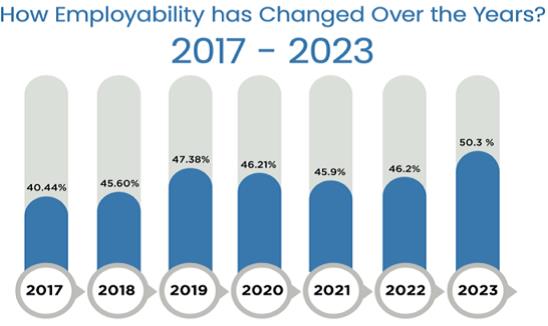
The current state of employability
Mr Sinha shared his perspectives on how employability varies across disciplines, domains and even regions.
Disciplines like Arts and Commerce are relatively in greater demand compared to MCA and Polytechnics. Why is this so? The BCom curriculum (61% employability) does expose students to basic business acumen. Arts students are probably in demand because of the growing importance of content development in general and storytelling in particular. The automotive sector is employing more students because of Industry 4.0 which is a combination of some 10 technologies (AI, ML, fuel cells, additive manufacturing, cloud, etc).
Why are some courses struggling? The MCA curriculum probably is outdated. The success of polytechnics depends on how we shape vocational education. While NEP does give greater importance to vocational education, there are some major challenges to be addressed as Mr Sinha explained during the Q&A session.
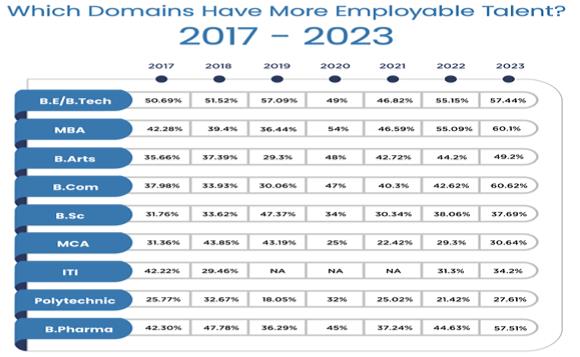
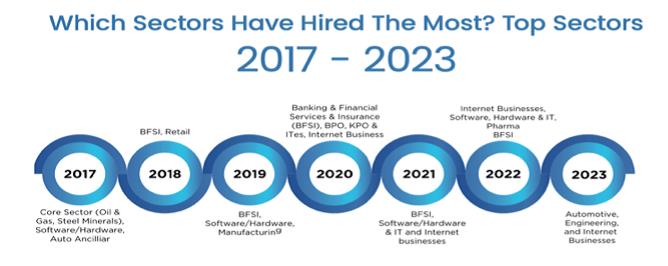
Traditional engineering disciplines like Mechanical and Civil are struggling in terms of employability.
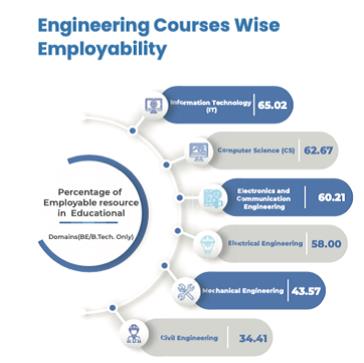
The participation of women has been increasing over the years. This will enable diversity and inclusion.
Interest in the domain is important. Students should avoid the herd mindset. Mr Sinha recalled an incident where some 17,600 people applied for 200 jobs in Infosys.
English language, numerical reasoning, critical thinking and computer skills will be critical for employability.
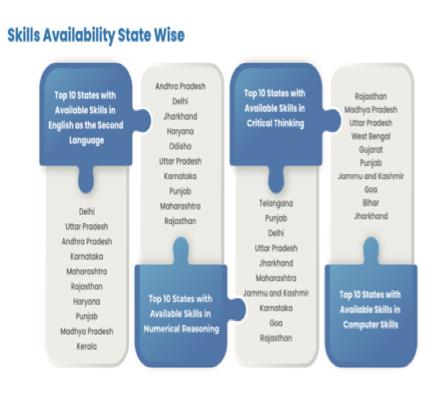
Bangalore, Hyderabad, Chennai, and Pune are the most preferred cities for our workforce.
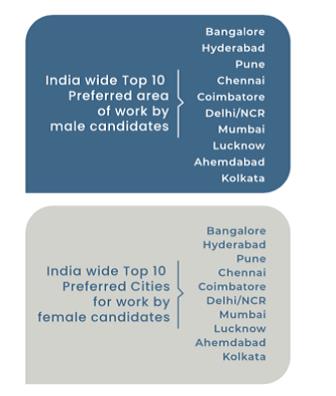
T shaped vs Pi shaped profile
The need of the hour is a pi shaped profile. The I-shaped professional is well versed in a specific area of expertise and goes deeper and deeper into the chosen field. The T-shaped person has an area of expertise but also broader skills and knowledge across various areas. Pi-shaped people have a broad mastery of general knowledge but also deep functional or domain expertise in two or more areas.
Skills
Keeping in mind the importance of skills, many states have set up skills universities. But Mr Sinha felt this may not be the right approach. We should build skills into the curriculum rather than treat them separately.
Skill building can succeed only with the active participation of industry. Germany has succeeded in the global arena thanks to its well-known apprenticeship program. In India, the apprenticeship program has not taken off. It is important to pick up practical knowledge. Apprenticeships have an important role to play.
McKinsey has identified a set of 56 skills across domains. The NEP has emphasised the need for 21st century skills. Adaptability and learnability are the most important skills.
During the Q&A, Mr Sinha added that a skilling program will succeed only if we ae clear about the objective. While the outcomes of many skilling programs have been far from satisfactory, he gave the example of a program which worked very well. The Electronics System Design and Manufacturing (ESDM) program attracted 17,000 students. Some 12,000 students got their certification and 8000 got jobs.
During the Q&A, Mr Sinha also emphasised that skilling programs should not start in the final year of the course as part of placement preparation. Skill building should begin from the first year. This is the philosophy which TASK has embraced for training students in AutoCAD. It begins in the first year. By the time the course is complete, students have built sufficient proficiency and are employable.
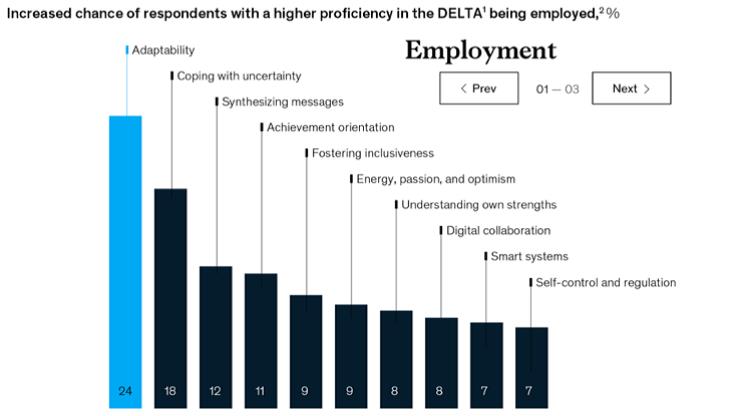
Even as a schoolboy, Mr Sinha realized his interest when he started writing Fortran and Cobol programs on punched cards for his father who was managing the payroll at Indian Metrological Department. This prompted him to look seriously at the IT industry. While at Aptech, Mr Sinha not only strengthened his expertise but also found opportunities to be mentored by senior industry leaders like Vishnu Hari Dalmia.
Mr Sinha realized that the top universities like the IITs were not really focused on skill building. Companies like NIIT and Aptech were doing this. Interested in skill building, Mr Sinha joined the online university, U21 Global just around the time of the dotcom bust. Mr Sinha learned the importance of instruction design and building small capsules that would make learning easier for students and enable greater retention.
Driven by a desire to serve the country, Mr Sinha returned from Malaysia and started a venture. Subsequently, he joined the NASSCOM Foundation, which was trying to serve the needs of students in Tier 2 and Tier 3 areas. About four years back, when the opportunity to lead TASK came his way, Mr Sinha was quick to take up the challenge. More so, as he had worked closely with Mr KTR and Mr Jayesh Ranjan earlier.
Looking back at his career, Mr Sinha felt that learning agility, adaptability, lifelong learning (Learning does not end with college.) and openness to new experiences and challenges are the key to career success.
The basic problem in India is the stigma attached to vocational training. Then there is the question of industry sponsorship. In Germany, the industry body certifies the quality. Unfortunately, in India, the industry associations are not actively involved in apprenticeships.
We should also look beyond the large companies. Both in terms of employment and learning, the MSMEs offer a wealth of opportunities. While large enterprises account for only 12 million jobs, MSMEs account for 113 million jobs. Students can also learn much more while working in an MSME. Our students should have the right role models such as Skyroot, the space venture rather than being happy with steady 9 to 5 jobs in large corporations.
The objective of assessments should not be to frighten students. From fear of performance, we must move towards celebration of learning. The focus should be on testing the student’s ability to apply the concepts to new situations and not on definitions.
Psychometric assessments can also be used to enable students to understand where they will fit in better. Such assessments will enable career counselling which is missing today in most colleges. (The use of industry mentors for career counselling can also be very effective.)
Students are bound to be employable if two conditions are met. They enter a profession they are best equipped for. They learn the concepts so well that they can apply them to solve various kinds of problems.
Many faculty members do not have any industry experience. So, we should offer internships to them as well. Infosys offers immersive experience to faculty in the latest technologies along with mentoring by its executives.
This is a great idea. NRIs are already involved in the IT towers that are being set up in Tier2/Tier 3 towns like Khammam and Karimnagar.
If individuals do it, we call it jugaad. If larger institutions do it, we call it research. We should avoid this kind of classification. Quick fix is an important component of innovation. Any idea that solves a real problem is worthy of being called an innovation.
Reading, writing, listening, and speaking English are all extremely important. The global language learning market is estimated at $ 52 bn and there are some 1.6 billion learners.
Many students understand English but cannot communicate effectively. TASK has tied up with former Test cricketer, K Srikanth to enable students to learn English online through cricket. Students can learn reading and writing at their own pace.
Employability applies at the beginning of the career. It is for the first job. To remain employed, one must plan for the entire career. That calls for lifelong learning and becoming a pi shaped professional.
We must make learning fun. As mentioned earlier, from fear of performance, we must move towards celebration of learning. Career counselling is important. The inclination of students should be identified at an early age. For example, students with a creative bent of mind can be provided special training right from say Class 6. Faculty need skills in counselling students.
We must encourage students to ask for help when they feel any pressure. Specifically, Mr Sinha felt that cyber bullying has become a big concern and girls are vulnerable. They should protect themselves and ask for help when needed. In general, we should be cyber aware.
There is an obsession with these rankings. But these rankings should only be the beginning of the journey. Institutions should try to achieve excellence far beyond the requirements of NIRF. NIRF criteria should not be treated as tick in the box items. ISB is a good example. It has become a global centre of excellence for management education without being unduly worried about the NIRF rankings.
